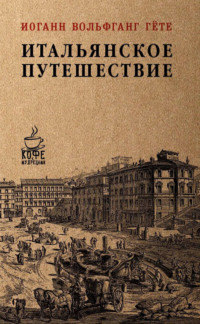
Letters from Switzerland and Travels in Italy
In the ship itself things looked very different from what they had done in the Neapolitan corvette. However, as we gradually stood off from the shore, we were quite taken up with the glorious view presented by the circular line of the Palazzata, the citadel, and by the mountains which rose behind the city. Calabria was on the other side. And then the wide prospect northwards and southwards over the strait, – a broad expanse indeed, but still shut in on both sides by a beautiful shore. While we were admiring these objects, one after another, our attention was diverted to a certain commotion in the water, at a tolerable distance on the left hand, and still nearer on the right, to a rock distinctly separate from the shore. They were Scylla and Charybdis. These remarkable objects, which in nature stand so wide apart, but which the poet has brought so close together, have furnished occasion to many to make grave complaints of the fabling of poetry. Such grumblers, however, do not duly consider that the imaginative faculty invariably depicts the objects it would represent as grand and impressive, with a few striking touches, rather than in fulness of detail, and that thereby it lends to the image more of character, solemnity, and dignity. A thousand times have I heard the complaint that the objects for a knowledge of which we are originally indebted to description, invariably disappoint us when we see them with our own eyes. The cause is, in every case, the same. Imagination and reality stand in the same relation to each other as poetry and prose do: the former invariably conceives of its objects as powerful and elevated, the latter loves to dilate and to expand them. A comparison of the landscape painters of the 16th century with those of our own day, will strikingly illustrate my meaning. A drawing of Iodocus Momper, by the side of one of Kniep's outlines, would at once make the contrast intelligible.
With such and similar discourses we contrived to amuse ourselves, since the coasts were not attractive enough, even for Kniep, notwithstanding his having prepared everything for sketching.
As to myself, however, I was again attacked with sea-sickness; but this time the unpleasant feeling was not relieved by separation and privacy, as it was on our passage over. However, the cabin was large enough to hold several persons, and there was no lack of good mattresses. I again resumed the horizontal position, in which I was diligently tended by Kniep, who administered to me plenty of red wine and good bread. In this position our Sicilian expedition presented itself to my mind in no very agreeable light. On the whole, we had really seen nothing but traces of the utterly vain struggle which the human race makes to maintain itself against the violence of Nature, against the malicious spite of Time, and against the rancour of its own unhappy divisions. The Carthaginians, the Greeks, the Romans, and the many other races which followed in succession, built and destroyed. Selinus lies methodically overthrown by art and skill; two thousand years have not sufficed to throw down the temples of Gergenti; a few hours, nay a few minutes were sufficient to overwhelm Catania and Messina. These sea-sick fancies, however, I did not allow to take possession of a mind tossed up and down on the waves of life.
At Sea, Tuesday, May 16, 1787.
My hope of having a quicker passage back to Naples, or at least of recovering sooner from my sea-sickness, has been disappointed. Several times I attempted, at Kniep's recommendation, to go up on deck; however all enjoyment of the varying beauty of the scene was denied me. Only one or two incidents had power to make me forget awhile my giddiness. The whole sky was overcast with a thin vapoury cloud, through which the sun (whose disk, however, was not discernible) illuminated the sea, which was of the most beautiful blue colour that ever was seen. A troop of dolphins accompanied the ship; swimming or leaping they managed to keep up with it. I could not help fancying that in the deep water, and at the distance, our floating edifice must have seemed to them a black point, and that they had hurried towards it as to a welcome piece of booty and consumption. However that may be, the sailors did not treat them as kind guides, but rather as enemies; one was hit with a harpoon, but not hauled on deck.
The voyage from Messina to Naples
The wind continued unfavourable, and by continually tacking and manœuvring, we only just managed not to lose way. Our impatience at this only increased when some experienced persons among the passengers declared that neither the captain nor the steersman understood their business. The one might do very well as captain, and the other as a mariner – they were, however, not fit to be trusted with the lives of so many passengers and such a valuable freight.
I begged these otherwise most doughty personages to keep their fears to themselves. The number of the passengers was very great, and among them were several women and children of all ages; for every one had crowded on board the French merchantman, without a thought of any thing but of the protection which the white flag assured them from the pirates. I therefore represented to these parties that the expression of their distrust and anxiety would plunge in the greatest alarm those poor folk who had hitherto placed all their hopes of safety in the piece of uncoloured and unemblazoned linen.
And in reality, between sky and sea this white streamer, as a decided talisman, is singular enough. As parting friends greet each other with their white waving handkerchiefs, and so excite in their bosoms a mutual feeling – which nothing else could call forth – of love and affection divided for a while, so here in this simple flag the custom is consecrated. It is even as if one had fixed a handkerchief on the mast to proclaim to all the world, "Here comes a friend over the sea."
Revived from time to time with a little wine and bread, to the annoyance of the captain, who said that I ought to eat what was bargained for, I was able at last to sit on the deck, and to take part occasionally in the conversation. Kniep managed to cheer me, for he could not, this time by boasting of the excellent fare, excite my energy; on the contrary, he was obliged to extol my good luck in having no appetite.
Wednesday, April 15, 1787.
And thus mid-day passed without our being able, as we wished, to get into the Bay of Naples. On the contrary, we were continually driven more and more to the west, and our vessel, nearing the island of Capri, kept getting further from Cape Minerva. Every one was annoyed and impatient; we two, however, who could contemplate the world with a painter's eye, had enough to content us, when the setting sun presented for our enjoyment the most beautiful prospect that we had yet witnessed during our whole tour. Cape Minerva, with the mountains which abut on it, lay before our eyes in the brilliant colouring of sunset, while the rocks which stretched southwards from the headland, had already assumed a bluish tint. The whole coast, stretching from the Cape to Sorrento, was gloriously lit up. Vesuvius was visible; an immense cloud of smoke stood above it like a tower, and sent out a long streak southwards – the result, probably, of a violent eruption. On the left lay Capri, rising perpendicularly in the air; and by the help of the transparent blue halo, we were able distinctly to trace the forms of its rocky walls. Beneath a perfectly clear and cloudless sky glittered the calm, scarcely rippling sea, which at last, when the wind died away, lay before us exactly like a clear pool. We were enraptured with the sight. Kniep regretted that all the colours of art were inadequate to convey an idea of this harmony, and that not even the finest of English pencils would enable the most practised hand to give the delicacy of the outline. I, for my part, convinced that to possess even a far poorer memorial of the scene than this clever artist could produce, would greatly contribute to my future enjoyment, exhorted him to strain both his hand and eye for the last time. He allowed himself to be persuaded, and produced a most accurate drawing (which he afterwards coloured); and so bequeathed to me a proof, that to truly artistic powers of delineation, the impossible becomes the possible. With equally attentive eyes we watched the transition from evening to night. Capri now lay quite black before us, and, to our astonishment, the smoke of Vesuvius turned into flame, as, indeed, did the whole streak, which, the longer we observed it, became brighter and brighter; at last we saw a considerable region of the atmosphere, forming, as it were, the back ground of our natural picture, lit up-and, indeed, lightening.
The voyage from Messina to Naples
We were so entirely occupied with these welcome scenes, that we did not notice the great danger we were in. However, the commotion among the passengers did not allow us to continue long in ignorance of it. Those who were better acquainted with maritime affairs than ourselves were bitterly reproaching the captain and his steersman. By their bungling, they said, they had not only missed the mouth of the strait, but they were very nigh losing the lives of all the passengers intrusted to them, cargo and all. We inquired into the grounds of these apprehensions, especially as we could not conceive how, during a perfect calm, there could be any cause for alarm. But it was this very calm that rendered these people so inconsolable. "We are," they said, "in the current which runs round the island, and which, by a slow but irresistible ground-swell, will draw us against the rugged rocks, where there is neither the slightest footing, nor the least cove to save ourselves by.
Made more attentive by these declarations, we contemplated our fate with horror. For, although the deepening night did not allow us to distinguish the approach of danger, still we observed that the ship, as it rolled and pitched, was gradually nearing the rocks, which grew darker and darker upon the eye, while a light evening glow was still playing on the water. Not the slightest movement was to be discerned in the air. Handkerchiefs and light ribbons were constantly being held up, but not the slightest indication of the much desired breath of wind was discernible. The tumult became every moment louder and wilder. The women with their children were on the deck praying, not indeed on their knees, for there was scarcely room for them to move, but lying close pressed one upon another. Every now and then, too, they would rate and scold the captain more harshly and more bitterly than the men, who were calmer, thinking over every chance of helping and saving the vessel. They reproached him with everything which, during the passage up to this point, had been borne with silence – the bad accommodation, the high passage money, the scanty bill of fare, his own manners – which, if not absolutely surly, were certainly forbidding enough. He would not give an account of his proceedings to any one; indeed, ever since the evening before he had maintained a most obstinate silence as to his plans, and what he was doing with his vessel. He and the steersman were called mere money-making adventurers, who having no knowledge at all of navigation, had managed to buy a packet with a mere view to profit, and now, by their incapacity and bungling, were on the point of losing all that had been intrusted to their care. The captain, however, maintained his usual silence under all these reproaches, and appeared to be giving all his thoughts to the chances of saving his ship. As for myself, since I had always felt a greater horror of anarchy than of death itself, I found it quite impossible to hold my tongue any longer. I went up to the noisy railers, and, addressed them with almost as much composure of mind as the rogues of Malsesine. I represented to them that, by their shrieking and bawling, they must confound both the ears and the brains of those on whom all at this moment depended for our safety, so that they could neither think nor communicate with one another. All that you have to do, I said, is to calm yourselves, and then to offer up a fervent prayer to the Mother of God, asking her to intercede with her blessed Son to do for you what He did for His Apostles when on the lake Tiberias. The waves broke over the boat while the Lord slept, but Who when, helpless and inconsolable, they awoke Him, commanded the winds to be still; and Who, if it is only His heavenly will, can even now command the winds to rise. These few words had the best effect possible. One of the men with whom I had previously had some conversation on moral and religious subjects, exclaimed, "Ah, il Balarmé! Benedetto il Balarmé!" and they actually began, as they were already prostrate on their knees, to go over their rosaries with more than usual fervour. They were able to do this with the greater calmness, as the sailors were now trying an expedient the object of which was, at any rate, apparent to every eye. The boat (which would not, however, hold more than six or eight men) was let down and fastened by a long rope to the ship, which, by dint of hard rowing, they hoped to be able to tow after them. And, indeed, it was thought that they did move it within the current, and hopes began to be entertained of soon seeing the vessel towed entirely out of it. But whether their efforts increased the counteraction of the current, or whatever it was, the boat with its crew at the end of the hawser was suddenly drawn in a kind of a bow towards the vessel, forming with the long rope a kind of bow – or just like the lash of a whip when the driver makes a blow with it. This plan, therefore, was soon given up. Prayer now began to alternate with weeping – for our state began to appear alarming indeed, when from the deck we could clearly distinguish the voices of the goatherds, (whose fires on the rocks we had long seen), crying to one another, "There is a vessel stranding below." They also said something else, but the sounds were unintelligible to me; those, however, who understood their patois, interpreted them as exclamations of joy, to think of the rich booty they would reap in the morning. Thus the doubt which we had entertained whether the ship was actually nearing the rocks, and in any immediate danger, was unfortunately too soon dispelled, and we saw the sailors preparing boat-poles and fenders, in order, should it come to the worst, to be ready to hold the vessel off the rocks – so long at least as their poles did not break, in which case all would be inevitably lost. The ship now rolled more violently than ever, and the breakers seemed to increase upon us. And my sickness returning upon me in the midst of it all, made me resolve to return to the cabin. Half stupefied, I threw myself down on my mattress, still with a somewhat pleasant feeling, which seemed to me to come over from the Sea of Tiberias, for the picture in Merian's Pictorial Bible kept floating before my mind's eye. And so it is: our moral impressions invariably prove strongest in those moments when we are most driven back upon ourselves. How long I lay in this sort of half stupor I know not, for I was awakened by a great noise overhead; I could distinctly make out that it was caused by great ropes being dragged along the deck, and this gave me a hope that they were going to make use of the sails. A little while after this Kniep hurried down into the cabin to tell me that we were out of danger, for a gentle breeze had sprung up; that all hands had just been at work in hoisting the sails, and that he himself had not hesitated to lend a hand. We were visibly getting clear off the rocks; and although not entirely out of the current, there was now a good hope of our being able to make way against it. All was now still again overhead, and soon several more of the passengers came below to announce the happy turn of affairs, and to lie down.
The voyage from Messina to Naples
When on the fourth day of our voyage, I awoke early in the morning, I found myself quite fresh and well, just as I had been at the same period of the passage from Naples; so that on a longer voyage I may hope to get off free, after paying to the sea a three days' tribute of sickness.
From the deck I saw with no little delight the island of Capri, at a tolerable distance on our lee, and perceived that the vessel was holding such a course as afforded a hope of our being able ere long to enter the gulf, which, indeed, we very soon afterwards accomplished. And now, after passing a hard night, we had the satisfaction of seeing the same objects as had charmed us so greatly the evening before, in a reversed light. We soon left this dangerous insular rock far behind us. While yesterday we had admired the right hand coast from a distance, now we had straight before us the castle and the city, with Posilippo on the left, together with the tongues of land which run out into the sea towards Procida and Ischia. Everyone was on deck; foremost among them was a Greek priest, enthusiastic in the praises of his own dear East; but who, when the Neapolitans on board, who were rapturously greeting their glorious country, asked him what he thought of Naples, as compared with Constantinople? very pathetically replied, "Anche questa è una città!" (This, too, is a city.)
We reached the harbour just at the right time, when it was thronged with people. Scarcely were our trunks and the rest of our baggage unshipped and put on shore ere they were seized by two lusty porters, who, scarcely giving us time to say that we were going to put up at Moriconi's, ran off with the load as if with a prize, so that we had difficulty in keeping them in view as they darted through the crowded streets and bustling piazzas. Kniep kept his portfolio under his arm, and we consoled ourselves with thinking that the drawings at least were safe, should these porters, less honest than the poor Neapolitan devils, strip us of all that even the very breakers had spared.
END OF TRAVELS IN ITALY1
The Duke Charles Augustus of Weimar, who travelled under the title of Count of…
2
Lake Lucerne.
3
A German mile is exactly equal to four English geographical, and to rather more than four and a quarter ordinary miles. The distance in the text may, therefore, he roughly set down as one hundred and four miles English. [A. J. W. M.]
4
The fiftieth anniversary of a wedding-day is so called in Germany. Trans.
5
A "convention's dollar" is a dollar coined in consequence of an agreement made between several of the German states, in the year 1750, when the Viennese standard was adopted. – Trans.
6
An allusion to the comic scene, in the puppet-play of Faust, from which Göethe took the subject of his poem. One of the two magic words (Berliche, Berloche) summons the devils, the other drives them away, and the Hanswurst (or buffoon), in a mock-incantation scene, perplexes the fiends, by uttering one word after the other, as rapidly as possible. – Trans.
7
Heliodorus, Bishop of Trieca, in Thessaly, in the fourth century, author of the "Œthiopics, or, the Amours of Theagenes and Chariclea," was, it is said, deprived of his bishopric for writing this work. – A. W. M.
8
Filangieri's sister.









